|
|
|
Sort Order |
|
|
|
Items / Page
|
|
|
|
|
|
|
| Srl | Item |
| 1 |
ID:
105944
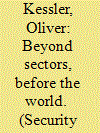

|
|
|
|
|
| Publication |
2011.
|
| Summary/Abstract |
While security and finance are certainly different social spheres, the fact that we can detect similar shifts in both points to the existence of something that precedes these 'realities'. If finance and security are said to be different, intertwined and related, the question then arises as to what it is that constitutes the differences and similarities between them. This article argues that further inquiry into the boundary between the two leads us to understand processes of securitization and financialization as constitutive processes by which actors, behaviours, practices or communications are considered to be economic or securitized. To capture processes of financialization, the article draws on systems theory in general and the concept of functional differentiation in particular.
|
|
|
|
|
|
|
|
|
|
|
|
|
|
|
|
| 2 |
ID:
123145
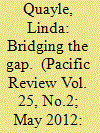

|
|
|
|
|
| Publication |
2012.
|
| Summary/Abstract |
The objective of a 'people-oriented' Association of Southeast Asian Nations (ASEAN) has not readily translated into easy relations between the Association and regional civil society. Discourse inspired by global civil society has found plenty to focus on in the gap between aspiration and practice. This article argues, however, that not enough attention has been directed to the bridges that are gradually forming across that gap, and suggests that an 'English School'-derived account can give a fuller picture of what is under way in this area. From this perspective, a process of institutionalization is observable among the different actors. By tackling - consciously or unconsciously - core problems such as recognition, location of common ground, confidence-building, and burden-sharing, this process is potentially transforming the relations of a state-imposed hierarchy into something more societal. The usefulness of such an approach lies in its ability to describe a process of slow change on its own terms, to normatively validate the fragile bridges under construction, and to stake out possibilities for progress on the basis of negotiation and accommodation.
|
|
|
|
|
|
|
|
|
|
|
|
|
|
|
|
| 3 |
ID:
110767
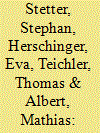

|
|
|
|
|
| Publication |
2011.
|
| Summary/Abstract |
In the current literature in International Relations and Conflict Studies, water as a source of conflict is either extremely over- or exceedingly underrated. In order to account for the dynamics of water conflicts, it is argued in this article that the study of water conflicts should be linked to comprehensive theories of social conflict and world society. A theoretical framework is developed based on a combination of securitization theory, modern systems theory and sociological neo-institutionalism. The usefulness of this framework is illustrated through two empirical cases of water conflicts, namely Spain and Egypt/Sudan. This study contributes to an understanding of the evolution of water conflicts as a result of securitization practices, the dynamics of these conflicts as complex social systems and as the outcome of local adaptations to and of 'world cultural' frames.
|
|
|
|
|
|
|
|
|
|
|
|
|
|
|
|
| 4 |
ID:
118414
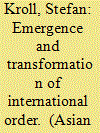

|
|
|
|
|
| Publication |
2013.
|
| Summary/Abstract |
The interaction between global and local norms is the key issue of sociolegal research on globalization and world society. The global-local interaction of norms generally has two directions: world society theory, which discusses how global normative patterns shape the local legal systems they encompass, and how local actors and their interventions form and influence global legal developments. I argue in this article that both perspectives must be combined if we are to understand processes of global normative change. The global diffusion of normative models triggers local adaptations and reinterpretations that, in turn, have repercussions for the transformation of global normative models. The argument is developed by drawing on historical research on the introduction of European international law in China in the nineteenth and twentieth centuries.
|
|
|
|
|
|
|
|
|
|
|
|
|
|
|
|
| 5 |
ID:
073289
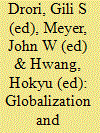

|
|
|
|
|
| Publication |
Oxford, Oxford University Press, 2006.
|
| Description |
xii, 322p.Pbk
|
| Standard Number |
0199284547
|
|
|
|
|
|
|
|
|
|
|
|
Copies: C:1/I:0,R:0,Q:0
Circulation
| Accession# | Call# | Current Location | Status | Policy | Location |
| 051559 | 658.4062/DRO 051559 | Main | On Shelf | General | |
|
|
|
|
| 6 |
ID:
153254
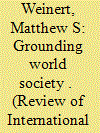

|
|
|
|
|
| Summary/Abstract |
The concept of world society has elicited sharp criticism for being too diffuse and amorphous owing to its synonymy with all transborder social relations, equability with humankind, or conflation with solidarist international society. To overcome these shortcomings, this article reconfigures world society by attaching otherwise unmoored social activity to an understanding of the world as comprised of shared social spaces. This spatialised reading foregrounds constellations of relations that have emerged in conjunction with discrete geographies – natural, economic, cyberspatial, cultural, anthropic – within which humans interact, and demonstrates that the world has become an actionable, political concept generative of activities peculiar to the space itself. A review of English School literature extracts four theses – purposive, plural, spatial, and stewardship – that invite conceptual reconstruction of world society. The article then addresses the discursive construction of cultural heritage as a worldly space populated with distinctive institutions and cognitive and normative commitments, and is followed by reflections on the added value of such an approach and directions for future research.
|
|
|
|
|
|
|
|
|
|
|
|
|
|
|
|
| 7 |
ID:
144455
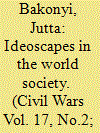

|
|
|
|
|
| Summary/Abstract |
The article uses the example of the Somali war to analyse how globally travelling ideas and political concepts are adapted to local settings and translated into frames that promote collective action and feature violence. It outlines how two ideas with universal claim, nationalism and modernisation were combined with an anti-colonial rhetoric and evolved into the meta-narrative of Somali history. This meta-narrative changed little, and keywords such as (pan-Somali) nationalism, anti-colonialism, development, sovereignty structure most of the discursive repertoires of political actors in Somalia. The main difference is that politicized clan affiliations were during the war dragged out of their shadowy existence and placed in the spot-light of political practice. They alone were however not sufficient to justify claims to power, but were complemented by ‘injustice’, ‘modernisation’ and ‘territorial’ narratives that justified violent deeds as ‘liberation’, ‘defence’ or ‘territorial rights’. Islamists employed similar key narratives and revived the pan-Somali anti-colonialist nationalism, but rooted it in a religious rational. Their ability to abandon culturalised frames contributed to their success.
|
|
|
|
|
|
|
|
|
|
|
|
|
|
|
|
| 8 |
ID:
106664
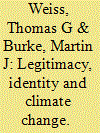

|
|
|
|
|
| Publication |
2011.
|
| Summary/Abstract |
Resource scarcity and climate change could provoke major inter-state and intra-state violence and humanitarian emergencies, an especial threat to the global South. This article examines the dynamics that have followed the major violent crises of the past few centuries to determine whether climate-change-induced conflict might paradoxically generate norms of non-violence and collective identification, and in turn lead to a more co-operative culture of anarchy. Especially since 1945 we have witnessed the development of a 'security community' in the North Atlantic-that is, a group of states that not only resolve conflict without resort to violence but also consider war among their members unthinkable. Such communities might develop in other regions in two stages. First, state internalisation of liberal norms of democracy and human rights may enhance the role of intergovernmental organisations in mitigating climate-change-induced conflict. Second, collective identification among states and individuals may be stimulated by structural similarity between increasingly democratic states, the perception of a common fate arising from shared threats, and an expanding global civil society and epistemic communities preoccupied with climate change. Climate change could thus spur movement towards more legitimate and authoritative intergovernmental organisations within a world society that would be more effective at solving common problems than those operating within today's more fragmented international society.
|
|
|
|
|
|
|
|
|
|
|
|
|
|
|
|
| 9 |
ID:
139852
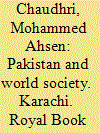

|
|
|
|
|
| Publication |
Karachi, Royal Book Company, 1987.
|
| Description |
xiv, 348p.hbk
|
| Standard Number |
9694070716
|
|
|
|
|
|
|
|
|
|
|
|
Copies: C:1/I:0,R:0,Q:0
Circulation
| Accession# | Call# | Current Location | Status | Policy | Location |
| 031760 | 954.9/CHA 031760 | Main | On Shelf | General | |
|
|
|
|
| 10 |
ID:
149436
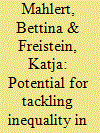

|
|
|
|
|
| Summary/Abstract |
The recently passed Sustainable Development Goals (SDGs) encompass a variety of explicit and implicit goals that address inequality. Although formulations remain vague and targets abstract, the SDGs go much further than previous development goals in addressing inequality as a central issue. Against the background of insights from inequality research, the article assesses their potential to become discursive resources for fundamental reforms of established development ideas.
|
|
|
|
|
|
|
|
|
|
|
|
|
|
|
|
| 11 |
ID:
077888
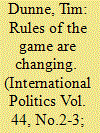

|
|
|
|
|
| Publication |
2007.
|
| Summary/Abstract |
Is there a crisis of legitimacy in relation to fundamental human rights commitments? At one level, the human rights regime has endured legitimacy problems from the outset, in part due to the scope and complexity of the standards but also as a result of the unwillingness of states to regard human rights norms as properly binding. I argue that September 11 and the responses this event triggered in the foreign policies of leading states in international society have taken the challenge to the regime to a new level. What makes it a crisis of legitimacy is the fact that those were crucial to the emergence of the regime, and the rights that are under siege are core 'rights of the person' and not aspirational rights. The closing discussion examines the possibility for a restoration of legitimacy. Consistent with the earlier theoretical discussion, the question of whether and how the legitimacy crisis can be resolved requires a differential response, depending on the site of the crisis, and the location of the audience. The concepts of international and world society provide analytical leverage in identifying both the causes of the crisis and the prospects for its resolution
|
|
|
|
|
|
|
|
|
|
|
|
|
|
|
|
| 12 |
ID:
099498
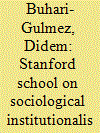

|
|
|
|
|
| Publication |
2010.
|
| Summary/Abstract |
Stanford School-World Society or World Polity approach-led by John W. Meyer has been largely overlooked despite its revolutionary insights (Robertson 2009). Nevertheless, renewed interest in neoinstitutionalisms and concepts as world society, culture, and legitimacy (Clark 2007) imply Stanford School's relevance for contemporary social and political sciences. This essay discusses first, the underlying theoretical arguments of the School, second, its main findings and responses to criticisms, and third, Stanford School's resonance with the Constructivist, Neoinstitutionalist, and Sociological turns in International Relations. Finally, it suggests that Stanford School opens new horizons for EU studies by establishing the "missing link" between globalization and European integration.
|
|
|
|
|
|
|
|
|
|
|
|
|
|
|
|
| 13 |
ID:
105647
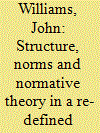

|
|
|
|
|
| Publication |
2011.
|
| Summary/Abstract |
This article looks at the significance of Barry Buzan's 2004 reformulation of the English School from the perspective of the normative dimension of English School theory. Picking up a challenge that Buzan set, but which has largely gone unanswered, for those who see normative theory as a key aspect of the English School's contribution, the article assesses three possible responses. It rejects a stance denying the relevance of Buzan's approach to normative theory and is dissatisfied with a second line that distinguishes methodologically between Buzan's social structural theorising and an approach to normative theory that draws principally on political theory. Instead, it argues for the inherent normativity of Buzan's position because of its reliance on values, arguing that many of the analytical benefits of Buzan's approach can also be deployed normatively because of the way he highlights contested and competing dynamics in play at different times and at different levels. The article suggests that this has the potential to revive pluralism as a normative position in the English School in a way that retains and extends the enhanced analytical power that Buzan's reformulation offers.
|
|
|
|
|
|
|
|
|
|
|
|
|
|
|
|
| 14 |
ID:
124620
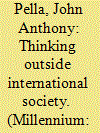

|
|
|
|
|
| Publication |
2013.
|
| Summary/Abstract |
English School theory presently features two distinct conceptions of world society, both of which are concerned with how to best conceptualise the role of non-state actors in international politics. While a classical interpretation advocates attaching world society to non-state cosmopolitan influence, a Buzanian interpretation prefers to analyze distinct interacting non-state units. What is unfortunate is that the comparative merits of these two interpretations remain largely in question, as there has been little attempt to contrast them either conceptually or in terms of potential empirical utility. The purpose of this article is to provide just such comparisons, so as to determine the possibilities for English School theorists seeking to think outside international society. To do this the theoretical underpinnings of the two concepts are analyzed initially, after which the explanatory power of each is tested in an empirical study of the trans-Atlantic slave trade and its abolition. In light of shortcomings found with the two concepts, an alternative suggestion is then offered. The suggestion is that world society be conceptualised in accordance with the ongoing contestations between different ideologies in the non-state world, on the basis of which individuals form different types of social relationships to influence the international society of states.
|
|
|
|
|
|
|
|
|
|
|
|
|
|
|
|
| 15 |
ID:
172288
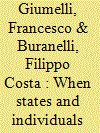

|
|
|
|
|
| Summary/Abstract |
Interaction between individuals and states is considered a distinctive character of domestic politics, while international politics is the ‘realm of states’. However, it is becoming more common to encounter loci where both states and individuals interact at the international level, such as in the cases of the Special Tribunals for Rwanda, Sierra Leone, Liberia and the Former Yugoslavia as well as the International Criminal Court (ICC). Within the International Relations (IR) theory panorama, one would expect the English School of International Relations (ES) to have the theoretical and analytical tools to conceptualize synergies between states and individuals, but this is not evident. This article asks, how does the interaction between individuals and states take place in the ES? We argue that this interaction takes place via ‘contact points’, defined as those international bodies that bring together states and non-state actors, be they individuals or groups, interacting on equal grounds in terms of rights and responsibilities towards each other. The notion of ‘contact point’ is developed inductively by focusing on the Office of the Ombudsperson to the Islamic State of Iraq and the Levant (ISIL; Da’esh) and Al-Qaida Sanctions Committee. This research has theoretical implications. We aim to refine, sharpen and advance both the ES’s theoretical and analytical architecture. The contribution we seek to make is one that will better equip ES scholars to conceptualize and analyse those secondary institutions that allow states and individuals to enjoy rights and duties equally. By so doing, we will make possible for the ES to provide a more fine-grained account for these synergies than other IR theories. The notion of ‘contact point’ does set a new agenda for the ES, since interactions between individuals and states are likely to become a constitutive essence of world politics.
|
|
|
|
|
|
|
|
|
|
|
|
|
|
|
|
| 16 |
ID:
177600
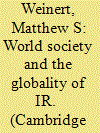

|
|
|
|
|
| Summary/Abstract |
Diogenes the Cynic famously declared that he was a kosmou politês—a citizen of the world. No doubt a radical proposition as much for ancient as it is for modern ears, Seneca understood the claim not as erasing local sources of identity, political action, and ethical obligation, but as enriching them and, importantly, constraining their worst manifestations, since our common humanity requires that we not injure ‘its fundamental ingredients’ of reason and moral choice. As such, the kosmou politês ‘is the ancestor and source of Kant’s idea of the “kingdom of ends” ‘which enjoins us ‘to treat with equal respect the dignity of…every human being’ (Nussbaum 2002, 7–8).
|
|
|
|
|
|
|
|
|
|
|
|
|
|
|
|
| 17 |
ID:
139004
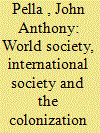

|
|
|
|
|
| Summary/Abstract |
This article utilizes an English School approach to examine the European colonization of Africa between 1871 and 1908. Drawing upon Clark's framework for understanding the relationship between world society, international society and international institutions, it argues that the colonization of Africa was very much dependent upon the activity of non-state actors who essentially pushed European states into the formal colonization of the African interior. Such a case sheds important light on the destructive role world society has played in international politics, a topic which has received no attention in the English School literature. Moreover the study provides additional empirical insights into the relationship between world society, international society and international institutions, while also bringing much needed empirical discussion of colonization into the English School catalogue.
|
|
|
|
|
|
|
|
|
|
|
|
|
|
|
|
| 18 |
ID:
147969
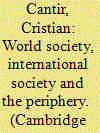

|
|
|
|
|
| Summary/Abstract |
Many studies of world society in the English School claim that non-state actors gain importance in international relations when they try to influence the most important members of the society of states. This article argues that such an approach overlooks the diversity of world society activities. First, it obscures the activities of world society actors beyond the core and therefore offers an incomplete account of the agency such actors exercise in global affairs. Second, it overlooks the fact that non-state actors from the core can disseminate some of the core’s values beyond its borders. The example of British abolitionist contact with the post-slave state of Haiti in the first two decades of the nineteenth century serves as an empirical illustration of these two points. The case study is particularly useful because conventional narratives of abolitionist activism tend to concentrate on contact with the core members of the society of states and overlook equally significant efforts to “teach” former slaves how to become respectable members of the society of states.
|
|
|
|
|
|
|
|
|
|
|
|
|
|
|
|
| 19 |
ID:
111929
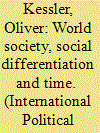

|
|
|
|
|
| Publication |
2012.
|
| Summary/Abstract |
In the current attempt to develop a Global Political Sociology, the concept of functional differentiation increasingly attracts attention. Functional differentiation seems to promise an avenue to describe global processes beyond a methodological nationalism. In this contribution I argue that while we have already made some progress in describing the spatial implications of functional differentiation, less effort has been spent on the temporal side of the story. This contribution highlights this aspect and points to shifting temporalities in the context of finance and international law. This perspective suggests that many "governance problems" might be due to the clash of different temporalities co-existing in world society.
|
|
|
|
|
|
|
|
|
|
|
|
|
|
|
|
|
|
|
|
|